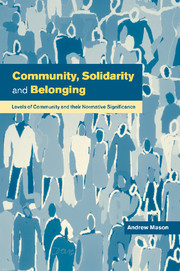Book contents
- Frontmatter
- Contents
- Acknowledgements
- Introduction
- Part 1 Community and its value
- Part 2 Political community in a culturally diverse society
- Part 3 Political community and the limits of global community
- 7 The ideal of global community and the principle of non-intervention
- 8 Political communities, global solidarity and the state system
- Conclusion
- Bibliography
- Index
7 - The ideal of global community and the principle of non-intervention
Published online by Cambridge University Press: 22 September 2009
- Frontmatter
- Contents
- Acknowledgements
- Introduction
- Part 1 Community and its value
- Part 2 Political community in a culturally diverse society
- Part 3 Political community and the limits of global community
- 7 The ideal of global community and the principle of non-intervention
- 8 Political communities, global solidarity and the state system
- Conclusion
- Bibliography
- Index
Summary
Very few states can boast that their citizens come close to forming an inclusive political community, let alone that they measure up to the more demanding liberal and republican ideals of political community. Many polities fall short of being inclusive political communities either because they exclude some from the political process or because they lack liberal institutions (or both). At the very best, these polities are communities in the bare ordinary sense: their citizens share some values, a way of life, identify with their major institutions and practices, and acknowledge each other as members.
Some theorists have thought that we should at least operate with a presumption that the citizens of different states form communities, and that such a presumption is sufficient to underwrite a general principle of non-intervention in their internal affairs. But even if this presumption is justified, it is clear that political communities in the ordinary sense may be governed by grossly unjust institutions and practices (judged from the broadly liberal perspective I have been presupposing), and then the principle of non-intervention prevents others from coming to the aid of the victims, acting from a liberal ideal of global community. In effect the principle of non-intervention resolves conflicts between allowing political communities (in the ordinary sense) to maintain their unjust institutions and practices, and promoting a liberal vision of global community (in the moralized sense), in favour of the former.
- Type
- Chapter
- Information
- Community, Solidarity and BelongingLevels of Community and their Normative Significance, pp. 173 - 200Publisher: Cambridge University PressPrint publication year: 2000



